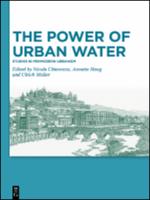The Power of Urban Water
Studies in Premodern Urbanism
Contributor(s)
Chiarenza, Nicola (editor)
Haug, Annette (editor)
Müller, Ulrich (editor)
Language
EnglishAbstract
Water is a global resource for modern societies - and water was a global resource for pre-modern societies. The many different water systems serving processes of urbanisation and urban life in ancient times and the Middle Ages have hardly been researched until now. The numerous contributions to this volume pose questions such as what the basic cultural significance of water was, the power of water, in the town and for the town, from different points of view. Symbolic, aesthetic, and cult aspects are taken up, as is the role of water in politics, society, and economy, in daily life, but also in processes of urban planning or in urban neighbourhoods. Not least, the dangers of polluted water or of flooding presented a challenge to urban society. The contributions in this volume draw attention to the complex, manifold relations between water and human beings. This collection presents the results of an international conference in Kiel in 2018. It is directed towards both scholars in ancient and mediaeval studies and all those interested in the diversity of water systems in urban space in ancient and mediaeval times.
Keywords
Water; UrbanityDOI
10.1515/978311067706ISBN
9783110677065Publisher
De GruyterPublisher website
https://www.degruyter.com/Publication date and place
2020Imprint
De GruyterClassification
Archaeology by period / region
Ancient World


 Download
Download